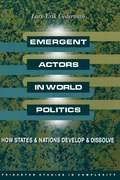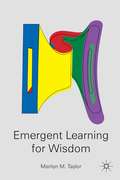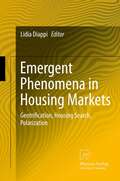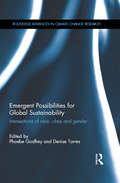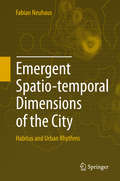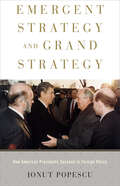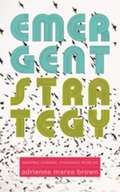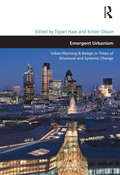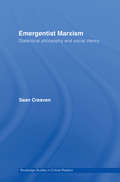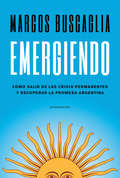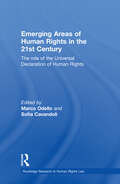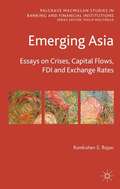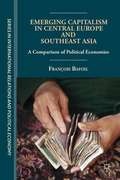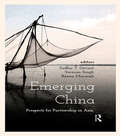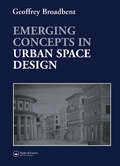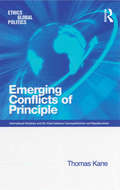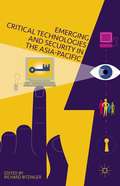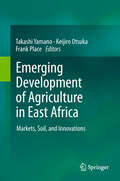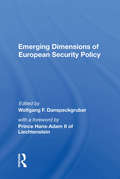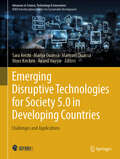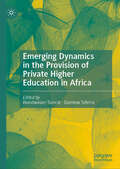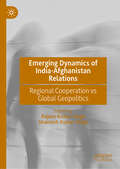- Table View
- List View
Emergent Actors in World Politics: How States and Nations Develop and Dissolve (Princeton Studies in Complexity #39)
by Lars-Erik CedermanThe disappearance and formation of states and nations after the end of the Cold War have proved puzzling to both theorists and policymakers. Lars-Erik Cederman argues that this lack of conceptual preparation stems from two tendencies in conventional theorizing. First, the dominant focus on cohesive nation-states as the only actors of world politics obscures crucial differences between the state and the nation. Second, traditional theory usually treats these units as fixed. Cederman offers a fresh way of analyzing world politics: complex adaptive systems modeling. He provides a new series of models--not ones that rely on rational-choice, but rather computerized thought-experiments--that separate the state from the nation and incorporate these as emergent rather than preconceived actors. This theory of the emergent actor shifts attention away from the exclusively behavioral focus of conventional international relations theory toward a truly dynamic perspective that treats the actors of world politics as dependent rather than independent variables. Cederman illustrates that while structural realist predictions about unit-level invariance hold up under certain circumstances, they are heavily dependent on fierce power competition, which can result in unipolarity instead of the balance of power. He provides a thorough examination of the processes of nationalist mobilization and coordination in multi-ethnic states. Cederman states that such states' efforts to instill loyalty in their ethnically diverse populations may backfire, and that, moreover, if the revolutionary movement is culturally split, its identity becomes more inclusive as the power gap in the imperial center's favor increases.
Emergent Learning for Wisdom
by Marilyn M. TaylorThe new millennium presents us with unexpected events that challenge us to think and act in different ways. Meeting these challenges requires creation of knowledge and development of wisdom. This book draws together forty years of scholarship, practice and original research, to catalyze our expertise in learning about what we don't know.
Emergent Phenomena in Housing Markets: Gentrification, Housing Search, Polarization
by Lidia DiappiThe housing market, like every market, is the product of thousands of interacting buyers and sellers driven by different interests. But unlike other markets, the housing market is able to profoundly transform the socioeconomic structure and the image of a city. Very often, changes in urban space are the result of the imperceptible operation of a multitude of micro-transformations which act with such great energy and decisiveness that they can transform the 'DNA' of entire urban neighborhoods. These qualitative novelties, unpredictable and non-deducible on the basis of the previous properties, are defined emergences. Namely emergence means a 'pattern formation' characterized by a self-organizing process driven by non-linear dynamics. This book explores housing market emergence in light of three different phenomena: search for housing, social polarization, and gentrification. The book is divided into two parts. The first part presents contributions on modelling emergence of different phenomena, formalised in multi-agent systems. The second part gathers empirical research and analyses aimed at supporting the findings of the models.
Emergent Possibilities for Global Sustainability: Intersections of race, class and gender (Routledge Advances in Climate Change Research)
by Phoebe Godfrey Denise TorresIt must be acknowledged that any solutions to anthropogenic Global Climate Change (GCC) are interdependent and ultimately inseparable from both its causes and consequences. As a result, limited analyses must be abandoned in favour of intersectional theories and practices. Emergent Possibilities for Global Sustainability is an interdisciplinary collection which addresses global climate change and sustainability by engaging with the issues of race, gender, and class through an intersectional lens. The book challenges readers to foster new theoretical and practical linkages and to think beyond the traditional, and oftentimes reductionist, environmental science frame by examining issues within their turbulent political, cultural and personal landscapes. Through a variety of media and writing styles, this collection is unique in its presentation of a complex and integrated analysis of global climate change and its implications. Its companion book, Systemic Crises of Global Climate Change, addresses the social and ecological urgency surrounding climate change and the need to use intersectionality in both theory and practice. This book is a valuable resource for academics, researchers and both undergraduate and post-graduate students in the areas of Environmental Studies, Climate Change, Gender Studies and International studies as well as those seeking a more intersectional analysis of GCC.
Emergent Spatio-temporal Dimensions of the City
by Fabian NeuhausThis book focuses on the creation of space as an activity. The argument draws not only on aspects of movement in time, but also on a cultural and specifically social context influencing the creation of the spatial habitus. The book reconsiders existing theories of time and space in the field of urban planning and develops an updated account of spatial activity, experience and space-making. Recent developments in spatial practice, specifically related to new technologies, make this an important and timely task. Integrating spatial-temporal dynamics into the way we think about cities aids the implementation of sustainable forms of urban planning. The study is composed of two different case studies. One case is based on fieldwork tracking individual movement using GPS, the other case utilises data mined from Twitter. One of the key elements in the conclusion to this book is the definition of temporality as a status rather than a transition. It is argued that through repetitive practices as habitus, time has presence and agency in our everyday lives. This book is based on the work undertaken for a PhD at the Centre for Advanced Spatial Analysis and was and accepted as thesis by University College London in 2013.
Emergent Strategy and Grand Strategy: How American Presidents Succeed in Foreign Policy
by Ionut PopescuWhat if successful strategies are sometimes formed through an emergent process of learning and adaptation?Is following a coherent grand strategy the key to achieving successful outcomes in American foreign policy? For many experts in academia and Washington, the answer is yes. Policymakers usually face criticism when they take incremental actions based on short-term considerations. But could such actions actually converge into a successful emergent strategy over time?Ionut Popescu conclusively shows that in some cases, an emergent learning model leads to better overall strategic performance than a long-term strategic plan or framework. Popescu argues that it is time to rethink the origins of some of the most important successes and failures of America’s tenure as a global superpower after World War II. Presenting empirical data culled from archival research and interviews with higher-ups, Popescu covers eight US presidential administrations, ranging from Truman to Obama, to demonstrate that senior policymakers should be skeptical of the idea that formulating and implementing a long-term grand strategy is the road to a successful foreign policy legacy.Instead, the book asserts, leaders should prioritize learning from the almost unavoidable mistakes they will make early in their careers and adapting their plans to unanticipated events and changes in the international environment. Emergent Strategy and Grand Strategy thus offers both scholars and practitioners of foreign policy an original theoretical framework to explain strategic success.
Emergent Strategy: Shaping Change, Changing Worlds
by Adrienne Maree BrownIn the tradition of Octavia Butler, here is radical self-help, society-help, and planet-help to shape the futures we want. Change is constant. The world, our bodies, and our minds are in a constant state of flux. They are a stream of ever-mutating, emergent patterns. Rather than steel ourselves against such change, Emergent Strategy teaches us to map and assess the swirling structures and to read them as they happen, all the better to shape that which ultimately shapes us, personally and politically. A resolutely materialist spirituality based equally on science and science fiction: a wild feminist and afro-futurist ride!adrienne maree brown, co-editor of Octavia’s Brood: Science Fiction from Social Justice Movements, is a social justice facilitator, healer, and doula living in Detroit.
Emergent Urbanism: Urban Planning & Design in Times of Structural and Systemic Change (Design And The Built Environment Ser.)
by Tigran Haas Krister OlssonIn the last few decades, many European and American cities and towns experienced economic, social and spatial structural change. Strategies for urban regeneration include investments in infrastructures for production, consumption and communication, as well as marketing and branding measures, and urban design schemes. Bringing together leading academics from across a range of disciplines, including Douglas Kelbaugh, Ali Madanipour, Saskia Sassen, Gregory Ashworth, Nan Elin, Emily Talen, and many others, Emergent Urbanism identifies the specific issues dominating today’s urban planning and urban design discourse, arguing that urban planning and design not only results from deliberate planning and design measures, but how these combine with infrastructure planning, and derive from economic, social and spatial processes of structural change. Combining explorations from urban planning, urban theory, human geography, sociology, urban design and architecture, the volume provides a comprehensive and state-of-the-art overview, highlighting the complexities of these interactions in space and place, process and design.
Emergentist Marxism: Dialectical Philosophy and Social Theory (Routledge Studies in Critical Realism)
by Sean CreavenIn tackling emergentist Marxism in depth, this well-written volume demonstrates that critical realism and materialist dialectics are indispensable to theorizing the functioning of complex social and physical systems. Author Sean Creaven investigates Marx’s dialectics of being and consciousness, forces and relations of production, base and superstructure, class structure and class conflict, and demonstrates how they allow the social analyst to conceptualize geo-history as embodying a tendential evolutionary directionality, rather than as simply random or indeterminate in terms of its outcomes. For those interested in social and political theory, Marxism and communism and contemporary social theory, this outstanding volume is an in important read and a valuable resource.
Emergere dalle liberazioni mancate per un’Africa libera e unita
by Joseph HabamahirweLa maggior parte dei paesi africani ha ottenuto l’indipendenza nel 1960. L’indipendenza ha acceso la speranza di donne e uomini del continente nero. Cosa è diventata l’Africa dopo poco più di 50 anni? Abbiamo forse ritrovato la nostra dignità? Siamo degli uomini liberi? La presente opera si propone di riflettere sui fatti concreti che impediscono all’Africa di camminare con le proprie gambe, suggerendo delle soluzioni percorribili al fine di costruire un’Africa veramente libera e unita. L’autore fa luce sul pensiero di Jean-Marc Ela. Non sorprende che il bilancio globale sia negativo dopo più di 50 anni d’indipendenza, anche se nei discorsi ufficiali viene affermato il contrario. Quest’opera si presenta come un’autopsia di quel continente che alcuni considerano come un’«appendice senza importanza». Tuttavia, non bisogna scoraggiarsi. La determinazione delle figlie e dei figli di questo continente può vincere la povertà, l’oppressione e lo sfruttamento vissuto quotidianamente dagli africani.
Emergiendo: Cómo salir de las crisis permanentes y recuperar la promesa argentina
by Marcos BuscagliaMarcos Buscaglia analiza en detalle la peor crisis de la historia argentina (2018-2020) y propone un conjunto articulado y sólido de reformas para que el país encuentre su rumbo y comience a emerger del subdesarrollo dando lugar a una nueva república, superadora de la conservadora y de la peronista. La Argentina atraviesa el peor momento de su historia al tiempo que los argentinos, que parecemos capaces de naturalizarlo todo, sin objetivos ni aspiraciones comunes, empezamos a desdibujar nuestra identidad como sociedad. Marcos Buscaglia describe aquí, con detalle y profundidad inéditos, la crisis 2018-2020, pero va mucho más allá: presenta una visión, un camino para empezar a emerger. La salida tiene que ver con la economía y con la política, claro, pero también con la ciudadanía y la cultura porque, en última instancia, de lo que se trata es de valores. Poco piadoso y preciso en el reconocimiento de nuestras inconsistencias, valiente y sólido en el enunciado de las reformas necesarias, entusiasta y esperanzado en el potencial argentino, este libro propone la construcción de una nueva república, superadora tanto de la conservadora como de la peronista. El mensaje es claro: con vocación de futuro y voluntad de éxito, si los argentinos nos ponemos de acuerdo sobre el rumbo, no habrá obstáculo difícil de sortear. Porque no podemos permitir que nos gane el caos, conforme empecemos a andar, iremos dejando en el pasado nuestra historia de desencuentro y fracaso recurrentes. Entonces sí, finalmente, estaremos emergiendo.
Emerging Afrikan Survivals: An Afrocentric Critical Theory (Studies in African American History and Culture)
by Kemayo KamauFirst published in 2003. Routledge is an imprint of Taylor & Francis, an informa company.
Emerging Areas of Human Rights in the 21st Century: The Role of the Universal Declaration of Human Rights (Routledge Research in Human Rights Law)
by Marco OdelloThis book includes a set of studies and reflections that have emerged since the adoption of the Universal Declaration of Human Rights in 1948. Encompassing a number of human rights, such as the right to environmental protection, the right to humanitarian aid, and the right to democratic governance, this collection focuses on issues and areas that were not originally mentioned or foreseen in the Declaration but that have since developed into salient topics. These developing rights are considered in the light of contemporary national and international law, as well as against the wider picture and the contexts in which human rights may have effect. Moreover, the topics covered take in a wide range of research fields, including law, politics and criminology. Emerging Areas of Human Rights in the 21st Century is aimed primarily at undergraduate and postgraduate students, and scholars interested in international law, human rights and politics.
Emerging Asia
by Ramkishen S. RajanThis book on the different aspects of international economic policy covers financial crises, reserve accumulation, capital flows and currency wars as well as issues relating to foreign direct investment and developments in China and India.
Emerging Capitalism in Central Europe and Southeast Asia: A Comparison of Political Economies
by François BafoilThis book examines the emergence of different forms of capitalism in Central-Eastern states in Europe and Mekong states within the Association of Southeast Asian Nations (ASEAN). All of them (but Thailand) have historically disappeared from the regional maps for long periods of time due to colonial or imperial rule. Most of them were previously members of a soviet-type economy, and they all joined ASEAN or the European Union in the 1990s or in the 2000s. These states are characterized by a strong urge toward feelings of national sovereignty due to their experiences with colonialism and imperialism. But, due to the regional economic pressures and the globalization dynamic, these states cannot articulate protectionist policies. They are forced to open their economies in order to attract Foreign Direct Investments. This results in less regulated and more political forms of capitalism than in some more developed capitalist countries. This book analyzes forms of capitalism as the arising from a combination of three conditions: the legacy of the foreign occupations, the national construction process of the sovereign state, and lastly, the dynamics of regional integration. These states' claims to national sovereignty and the manner in which they developed suggests a causative link between the forms of political domination that have presided over these transformations and the forms of capitalism that have resulted.
Emerging China: Prospects of Partnership in Asia
by Reena Marwah Sudhir T. Devare Swaran SinghThis volume seeks to examine the evolving contours of Asian multilateralism through emerging China and how it is likely to impact on the growth trajectories of Asian countries. From this perspective, it explores the prospects for ‘partnership’ in Asia, especially in terms of China’s engagement with its principal Asian neighbours, especially India. A substantial part of the volume is devoted to debating China–India relations, highlighting their mutual stakes through their economic and security cooperation as well as their engagement with other countries and regional forums. The book furthers the understanding of the rise of China from an Indian perspective while simultaneously locating China’s rise in the economic dynamics of an emerging Asia. The volume offers illuminating viewpoints, analyses and insights from multiple perspectives, mixed with academic rigour and up-to-date information. It will be of interest to those engaged in economics, politics, trade relations, Indo-China relations, foreign policy, area studies, public policy, and strategic studies.
Emerging Concepts in Urban Space Design
by Professor Geoffrey Broadbent Geoffrey BroadbentThis important work, now available in paperback, from Professor Geoffrey Broadbent, provides a clear analysis of the nature of many of today's design problems, identifying their causes in history and suggesting a basis for co-ordinated solutions. The author discusses `picturesque' and `formal' tendencies in modern architecture, relating them to parallels between philosophic thought and design theory through the ages. Using a wealth of international examples from around the world including America, UK, Italy, Germany and France and with over 250 photographs and illustrations, Emerging Concepts in Space Design offers a fascinating insight into the history and likely future directions of urban design.
Emerging Conflicts of Principle: International Relations and the Clash between Cosmopolitanism and Republicanism (Ethics and Global Politics)
by Thomas KaneDebates over the ethics of war, economic redistribution, resource consumption and the rights and responsibilities associated with membership of a political community are just some of the major conflicts of principle identified by Thomas Kane which characterize world politics today. According to the author, debates such as these are being drawn towards increasingly polarized positions represented by strongly universalist and particularist moral and political ideologies, such as cosmopolitanism and republicanism. Kane analyzes each of these areas, identifying that the potential for ideologically-driven conflict will constitute the greatest challenge facing scholars and policy makers in the twenty-first century.
Emerging Critical Technologies and Security in the Asia-Pacific
by Richard BitzingerThe proliferation of advanced militarily relevant technologies in the Asia-Pacific over the past few decades has been a significant, and perhaps even alarming, development. This volume addresses how such technologies may affect military capabilities and military advantage in the region.
Emerging Development of Agriculture in East Africa
by Frank Place Keijiro Otsuka Takashi YamanoEmerging Development of Agriculture in East Africa offers case studies that find promise in many new innovations. Farmers in Uganda have quickly learned the management of NERICA rice (a new upland rice variety), which is being disseminated in a limited way in the region. Also in Uganda, farmers living in more remote areas have improved access to markets due to the expansion of mobile phones. In Kenya, improved milk marketing systems have increased efficiency and led to tangible increases in the adoption of dairy production technologies. And the adoption of intensive dairy production systems in Kenya and Uganda are providing significant amounts of manure and positively impacting yields of maize and banana.
Emerging Digital Technologies and India’s Security Sector: AI, Blockchain, and Quantum Communications
by Pankaj K Jha Vedant Saigal Arun Teja PolcumpallyThis book is an introductory account for policy makers, academia, and interested readers on the digital technologies on Indian Military. It covers three technologies – AI, Blockchain, and Quantum communications – and provides a detailed account on the military use cases. It evaluates the readiness of Indian Military in these technologies. A foundational text, it not only provides key policy analysis but also identifies the gray areas for the future research in the security studies.The volume will be essential reading for scholars and researchers of military and strategic studies, especially future warfare, AI and Blockchain, and South Asian studies. It will be of interest to general readers as well.
Emerging Dimensions Of European Security Policy
by Wolfgang F. DanspeckgruberThis book represents an overview of European security affairs as of 1989–1990. It deals with fundamental theoretical and political-strategic considerations; looks at arms-control developments; and examines European defense economies and military industrial capabilities of U.S. .
Emerging Disruptive Technologies for Society 5.0 in Developing Countries: Challenges and Applications (Advances in Science, Technology & Innovation)
by Anand Nayyar Mariya Ouaissa Mariyam Ouaissa Moez Krichen Sara ArezkiThis book offers an overview of the recent disruptives technologies and their application in the new Society 5.0 for better human life. The content provides researchers by new trends in blockchain, IA, and big data applied to several fields related to smart cities and Society 5.0 such as health care, education, finance, mobility, logistics, and quality of life. It is an opportunity for researchers and practitioners to present and discuss their most recent research results, innovations, experiences, concerns, challenges, and trends about the application of disruptive technologies applied to Society 5.0. The aim of the book is to focus on how disruptive technologies can change the way we perform and how it creates more opportunities with a special focus on AI, blockchain, big data, etc. The idea behind this book is to focus on solutions based on disruptive technologies that can face the challenges of the developing countries. We will shed the light on different sectorssuch as education, agriculture, industry, transportation, environment, energy, health care, etc. We will discuss the challenges that the emerging countries face in these sectors and provide disruptive technologies based solutions to them. This book also introduces success stories of disruptive technologies-based solutions and their impact on the lives of people in developing countries.
Emerging Dynamics in the Provision of Private Higher Education in Africa
by Damtew Teferra Wondwosen TamratThis edited book examines the private higher education (PHE) sector in African countries. Reports suggest that private institutions across the continent outnumber their public counterparts, yet there has been little scholarly investigation into this emerging phenomenon. The book therefore seeks to document, map and analyse key trends and contemporary themes in the PHE sector, as well as chart historical developments, policy and regulatory frameworks. As a whole, it provides the reader with in-depth knowledge, rich perspectives and robust analyses from leading authorities in the field. Contributions from all sub-regions combine thematic issues with shaping discourse on the topic, and the discussions are undertaken in the context of global perspectives. The book will be of interest to academics, researchers, postgraduate students, policy makers, analysts and development partners interested in African higher education and PHE in particular.
Emerging Dynamics of India-Afghanistan Relations: Regional Cooperation vs Global Geopolitics
by Shantesh Kumar Singh Rajeev Kumar SinghThis book is about the trajectory of Indo-Afghanistan relations and its setting in the multilateral global order especially the interplay of the super-powers and the regional powers along with the emerging humanitarian crisis along with India’s concern and insecurity dilemma that emerged due to Taliban 2.0 in a multilateral setting. It is an attempt to evolve an understanding encompassing all the major dimensions of bilateral relations with special references to Asia. The content of the book encompasses the historical cultural and geo-political setting of the country in discussion as well as the role of the established and emerging superpowers and their possible implications. It will help readers understand the Afghanistan conundrum and the role of India and international players in the present state of affairs
